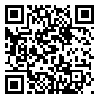Wed, Feb 4, 2026
[Archive]
Volume 15, Issue 45 (2022)
J Med Edu Dev 2022, 15(45): 77-79 |
Back to browse issues page
Research code: مروری
Ethics code: مروری
Download citation:
BibTeX | RIS | EndNote | Medlars | ProCite | Reference Manager | RefWorks
Send citation to:



BibTeX | RIS | EndNote | Medlars | ProCite | Reference Manager | RefWorks
Send citation to:
Salajegheh M. Appreciative Inquiry Approach in Evaluation of Medical Education Programs: Definition and Application. J Med Edu Dev 2022; 15 (45) :77-79
URL: http://edujournal.zums.ac.ir/article-1-1571-en.html
URL: http://edujournal.zums.ac.ir/article-1-1571-en.html
Kerman University of Medical Sciences , mahla.salajegheh90@gmail.com
Abstract: (3484 Views)
Background & Objective: The ultimate goal of educational program evaluation the development of individuals and organizations. Achieving this goal requires evaluation methods with a systematic approach to all components of the program.
Materials & Methods: In this narrative review study, the keywords "Appreciative Inquiry Approach", Program Evaluation", "Medical Education" were searched in Scopus, Web of Science, EMBASE, and Medline databases between 2010 and March 2021. After removing duplicates and considering the direct relationship of the articles to the study’s aim, full-text articles were reviewed.
Results: In searching for sources, 170 records were found, of which 15 articles were finalized. The steps of the appreciative inquiry approach for the evaluation and development of medical education programs were extracted.
Conclusion: The appreciative inquiry approach, as well as evaluating the program, promotes personal, organizational, and social development by enhancing individual and organizational capacities.
Materials & Methods: In this narrative review study, the keywords "Appreciative Inquiry Approach", Program Evaluation", "Medical Education" were searched in Scopus, Web of Science, EMBASE, and Medline databases between 2010 and March 2021. After removing duplicates and considering the direct relationship of the articles to the study’s aim, full-text articles were reviewed.
Results: In searching for sources, 170 records were found, of which 15 articles were finalized. The steps of the appreciative inquiry approach for the evaluation and development of medical education programs were extracted.
Conclusion: The appreciative inquiry approach, as well as evaluating the program, promotes personal, organizational, and social development by enhancing individual and organizational capacities.
Article Type : Review |
Received: 2022/04/11 | Accepted: 2022/06/7 | Published: 2022/08/11
Received: 2022/04/11 | Accepted: 2022/06/7 | Published: 2022/08/11
References
1. Shrivastava SR, Shrivastava PS. Employing a systematic approach to conduct program evaluation in medical education. J Health Res. 2019; 6(3):176-177. [DOI:10.4103/cjhr.cjhr_31_19]
2. Johnson BA. Transformation of online teaching practices through implementation of appreciative inquiry. Online Learning. 2014;18(3):1-21. [DOI:10.24059/olj.v18i3.428]
3. Jones J, Masika R. Appreciative inquiry as a developmental research approach for higher education pedagogy: Space for the shadow. High Educ Res Dev. 2021;40(2):279-92. [DOI:10.1080/07294360.2020.1750571]
4. Hung L, Phinney A, Chaudhury H, Rodney P, Tabamo J, Bohl D. Appreciative inquiry: Bridging research and practice in a hospital setting. Int J Qual Methods. 2018;17(1):1-10. [DOI:10.1177/1609406918769444]
5. Abouzeid E, Wasfy N, El-Zoghby S, Atwa H, Shalaby S, Zaghloul N, et al. Using appreciative inquiry to explore the disruptive effect of COVID-19 on medical student trust in their schools. MedEdPublish. 2020;18(1):1-19. [DOI:10.15694/mep.2020.000285.1C]
6. Hsieh JG, Kuo LC, Wang YW. Learning medical professionalism-the application of appreciative inquiry and social media. Med Educ Online. 2019;24(1):1586507. [DOI:10.1080/10872981.2019.1586507]
7. Jonker G, Booij E, Otte WR, Vlijm CM, Cate OT, Hoff RG. An elective entrustable professional activity-based thematic final medical school year: an appreciative inquiry study among students, graduates, and supervisors. Adv Med Educ Pract. 2018;15(9):837-845. [DOI:10.2147/AMEP.S176649]
8. Gaskin S, Williams M. Developing orientation leader training using appreciative inquiry. JCOTR. 2017;24(1):41-45. [DOI:10.24926/jcotr.v24i1.2908]
9. Fileborn B, Wood M, Loughnan C. Peer reviews of teaching as appreciative inquiry: learning from "the best" of our colleagues. High Educ. 2020; 3:1-5. [DOI:10.1007/s10734-020-00637-9]
10. Amundsen S, del Hierro G, Mullen T. Examining the Appreciative Instruction Methods Used by Instructors within an Adult Degree Completion Associate's Program. JAE. 2020;18(6):3-17.
11. Salajegheh M. Organizational impact of faculty development programs on the medical teacher's competencies. J Educ Health Promot. 2021 Jan 1;10(1):430.
Send email to the article author
| Rights and permissions | |
 |
This work is licensed under a Creative Commons Attribution-NonCommercial 4.0 International License. |




